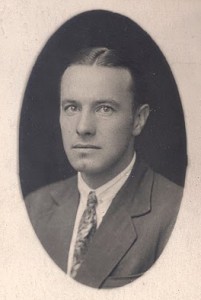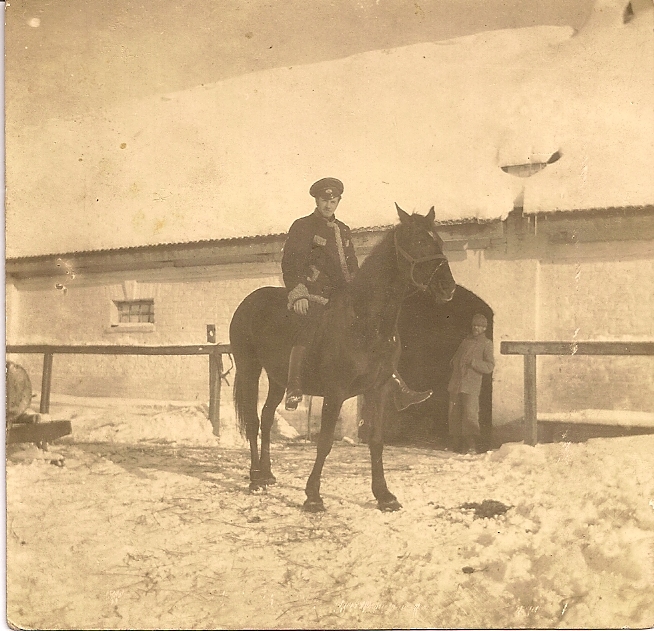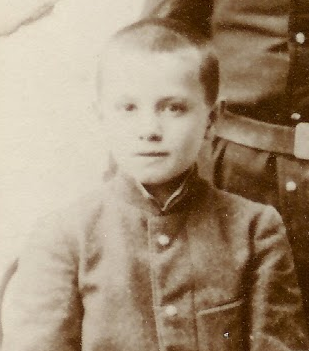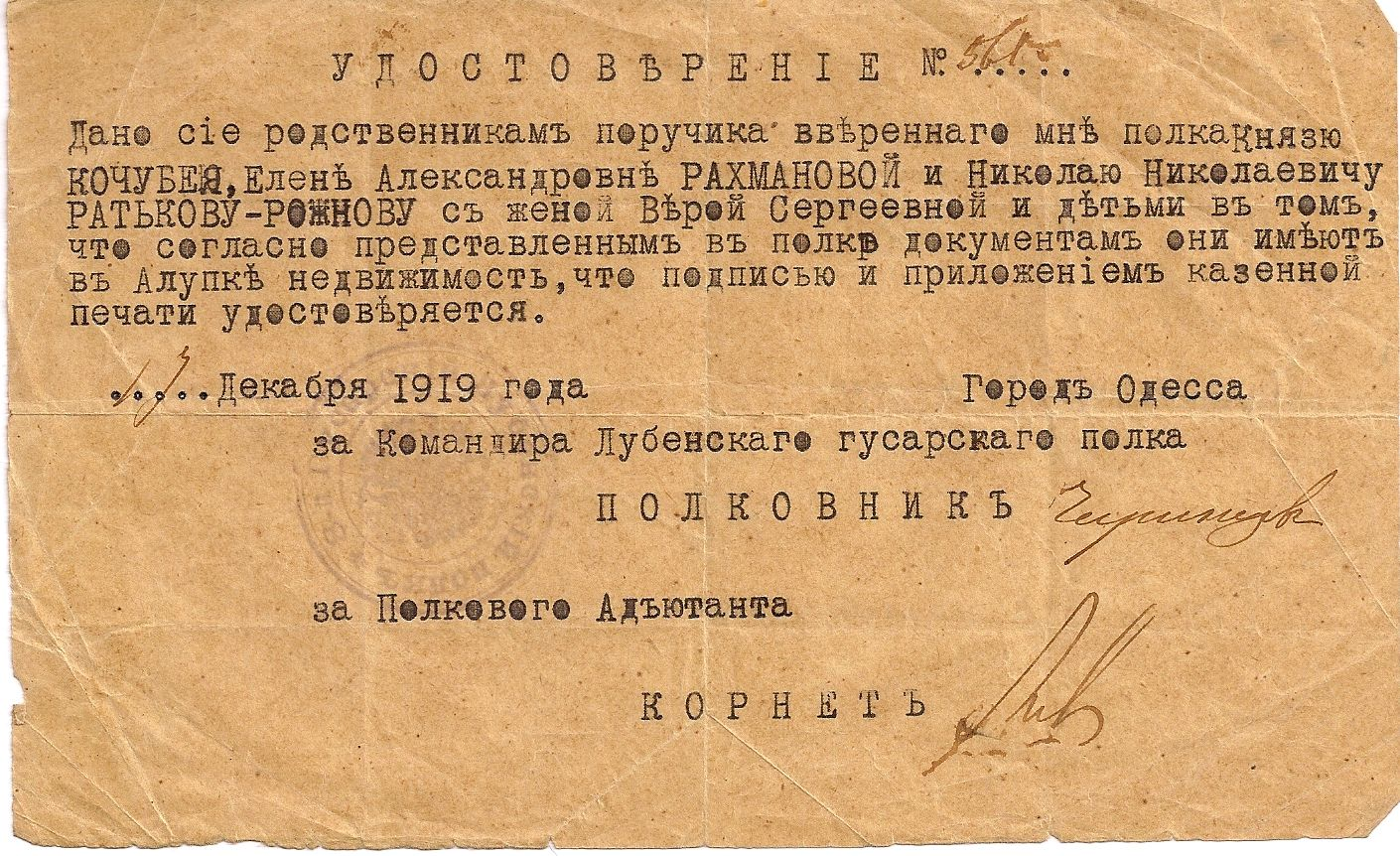 (b. Voronki, Tchernigov Province, Russia 1893 – d. Gagny, France 1963)*
(b. Voronki, Tchernigov Province, Russia 1893 – d. Gagny, France 1963)*
Born on the Steppe: Voronki
Mikhail “Misha” Mikhailovitch / Михаил Михайлович (1893-1963) was the son of playwright, Mikhail Nikolaievitch (1863-1935) and a local beauty, Pelegea Dmitrievna Onoshko / Пелагея Дмитрьевна Онощко (b. 1863-d. December 19, 1930). In addition to her legendary beauty, she would become recognized for being the driving force behind the success of Voronki as a commercial enterprise and remained in the village until her death in 1930. Sergei’s father abandoned the family and Russia in the years following the civil unrest in Ukraine, of 1905. He departed for France in 1913 where he died on the Cote d’Azur in 1935.
He was born on his Grandparents’ estate (Nikolai Arkadievitch and Elena Sergeievna (née Princess Volkonskaya) that was called Voronki (Вороньки (Черниговская область). The estate is located in the southern part of the Tchernigov province which is north of Kiev (today Bobrovitskiy Region) on the banks of the Supoi river. Even today, it is renowned for its unspoilt beauty and incredible nature. As of 1782, the property belonged to the Miloradovich family who had married into the Kotchoubey family in the early 18th century. It was purchased by Arkadi Vassilovitch for his son Nikolai in 1850. The land is characterized by vast plains punctuated by stands of pine trees which are separated by meandering rivers and beautiful lakes. Its historical significance today is largely due to the facts that the Kotchoubey’s lived there and the fact that the Decembrist, Prince Sergei Grigorovich Volkonsky and his wife, Princess Maria Nikolaivna (née Raevskaya) both died and were buried on the estate. There is a contemporary commemorative monument to them and their fellow exiled Decembrist, Alexander Poggio but the original chapel designed by Alexander Yagn and gravestones were destroyed in the 20th century.
Today this region is in Ukraine, and for 400 years it was part of a geographic region that was historically tied to the Zaporozhian Cossacks. The first Kotchoubeys to arrive in the region in the early 17th c. settled in and around Baturyn, which at the time was the capital of Tchernigov. The family played an important part in the history of this illustrious Cossack host, Imperial Russia and establishing Ukraine’s brief independence under the last Hetman before the rise of the Soviet Union.
Taking His own Path

Mikhail was the third of four brothers, Vassili, Nikolai, Mikhail & Sergei and one sister, Elena “Nelly.” Like his elder brothers, Mikhail was educated at home until he was sent to St. Petersburg in 1901 to the Nikolaevskiy Kadetskiy Corpus (Николаевский кадетский корпус) located at 23 Ofitserskaya Ulitsa . Mikhail had no inclinations to serve as an officer in the Russian army. He would pursue his studies in Kiev and he graduated from the University of Kiev with a law degree. It should be noted that the Corpus was a military school and more comfortable then other similar schools. Sergei benefited from the presence of his older brothers and various creature comforts which included the presence of servants.

Marriage:
In the full tumultuous mess that was the Civil War and the aftermath of the Russian revolution, Mikhail fell in love and married Olga Viktorovna (née Mankovskaya) / Ольга Викторовна Маньковская (Кочубей) (? -1979) in 1919. His brother, Sergei seized by the atmosphere that was both a feeling of “the end of the world” and at once a world where everything was possible and love was all around, fell in love and married her sister, Evgenia Viktorovna (née Mankovskaya) / Евгения Викторовна Маньковская (1900-1984). Misha had already lived on his own in a Khutor, or farmstead on the estate of Voronki. His was an idyllic cottage that allowed him to focus on his law studies and the management of the estate. Sadly, in some way, the simple homestead proved to be a temporary refuge from the marauding illiterate Bolsheviks who wandered the countryside, raping and pillaging people and the estate houses. Voronki was subjected to its first indignity in November 1917 when news of the revolution spread, the local peasants began to help themselves to the trees in the forest and began to indiscrimately cut as many logs as they could haul from the estate. They seemed to overlook the khutors. When Voronki was overrun by the “Reds” in January 1918, a local chapter of the Soviet was opened and the Kotchoubeys were given exactly one hour to evacuate. The first Kolkhoz “Pratzia/ Праця” was set up 9 years later in 1927. Mikhail exceptionally stayed behind as the only non-military brother who was also a Kiev trained lawyer. He used his skills as a lawyer to help the illiterate red commissars to draft their edicts. These were then posted around the village and meant to provoke the local peasants to seize lands and redistribute it amongst themselves. Hiding in the Khutor and collaborating with the “Reds” was a necessary survival mechanism because on one occasion he and his brother, Sergei were held at gunpoint as a gang of Reds raped their aunt, Olena “Alyena” Alexandrovna Rakhamanova. Olena had been visiting from neighbouring, Veisbohovka which was 30km away and found herself harassed by the barbaric men who claimed to bring good change to Russia.
Despite this terrible ordeal, Alyona survived and she had a tragic but long life. With her extended family, she would make her way to Florence, Italy during the civil war from Odessa in Dec. 1919. Florence after all was the city of her birth in 1873. Her cousin via the Kotchoubey’s, Vassili Vassilievitch / Василий Васильевич (1892-1971) was an adjoutant to Hetaman Pavlo Skoropadskiy and while his government had already fallen, his connections to the Wite movement were intact. As he was then serving as a commanding officer in the reconstituted Lubensky Hussar Regiment stationed in Odessa in November 1919, he organized the necessary evactuation papers for her and her traveling companions.
 Alyona was the adopted grandmother to Tekle Hawariat’s 9 children in Adis Ababa, Ethiopia whom she took care of in Paris years later and to her grandniece, Princess Elena Sergeievna Troubetzkaya (née Kotchoubey) (1935 -) and her grandnephew Andrei Sergeievitch (1938 – ) in Florence, Italy who called her babushka.
Alyona was the adopted grandmother to Tekle Hawariat’s 9 children in Adis Ababa, Ethiopia whom she took care of in Paris years later and to her grandniece, Princess Elena Sergeievna Troubetzkaya (née Kotchoubey) (1935 -) and her grandnephew Andrei Sergeievitch (1938 – ) in Florence, Italy who called her babushka.
She never married but she was courted by a persistent suitor, count Aleksei Alekseivitch Belevsky-Zhukovsky / Алексей Алексеевич Белёвский-Жуковский (1871-1930) (known by his Italian last name Segiano / Седжиано). He was the son of HIH Grand Duke Alexei Alexandrovitch / Великий князь Алексей Александрович (1850 – 1908) and his morganatic wife Alexandra Vassilievna Zhukovskaya / Александра Васильевна Жуковская (1842—1899). Alexei asked for Alyona’s hand in marriage but she spurned his marriage proposal to remain near her mother. In a purely Russian twist of fate, Alexei then married Princess Maria Petrovna Troubetzkaya / Мариа Петровна Трубецкая (1872—1954) who was the daughter of the Decembrist, Prince Sergei Petrovitch Troubetzkoy / Сергей Петрович Трубецкой (1790 -1860). Alexei finally got his Decembrist wife. Their daughter Maria Alekseevna Sverbeeva (née countess Belevskaya-Zhukovskaya) / Мария Алексеева Свербеева (Белёвская-Жуковская) (1901—1996), was not only a contemporary of Sergei Mikhailovitch second wife, Irina Georgevna (née Gabrichevska) / Ирина Георгиевна Кочубей (Габричевская) (1900-1996) but also a close friend. So the friendships forged in Siberia so many years ago by another generation would carry their fruits into subsequent generations. Alyona was left a spinster with her memories and her family to carry her through life.
Unlike his three brother, Misha was not a military man. In childhood and as a youth he was not particulalry tall or muscular but fastidious and elegant with a keen interest in jurisprudence, music and mechanics. While the family fled Voronki in January 1918 with one hour to load the carriage and depart, Misha stayed behind but the world he knew was collapsing into chaos. When he rejoined his brothers in the south of Russia, he settled in Rostov from 1918-1919 and took a job in the propaganda office of the White movement called OSVAG. It was probably a relief to be working in the cause of the Voluntary army and writing propaganda as well as press releases instead of helping illiterat commissars issue edicts in the village with the threat of reprisals from a drunkan communist revolutionary. Alas, while he was busy preparing copy, his brothers were galloping across the country side on secret missions for the OSVAGs intelligence department that was tasked with arresting and bringing to trial “red” agitators. Vassya had already had some experience in this domain as an officer in the Izumsky regiment on the Russian front, he was hunting down deserters who in early 1918 saw no reason to continue serving in the ill equipped Russian army with the death penalty for deserters lifted and the communists promising land distribution to eligible peasants.
Paris, France in Emigration:
 Mikhail and his young wife Olga were happy in Rostov despite the wartime stresses. By late 1920, with the departure of Denikin and Baron Wrangel assuming command of the Voluntary army, the tide had turned decidedly against the White movement. Misha laong with is brothers must have sensed that their position was perhaps that more precarious because of their work in the intelligence arm of the White army movement and the brothers made plans to evacuate with the white army from Sevastopol. The oldest brother Vassya was in contact with his wife Milochka who was living in Kiev with their two children, nine year old Olga and five year old Georgi. It was decided that he would leave along with his brothers and return to Kiev to bring her out or make arrangements for her to leave Kiev via Odessa. Kolya with his wife Sophia and the youngest, Sergei with his wife Evgenia were already to depart. In November they sailed on different ships, bound for Constantinople in the famous Wrangel fleet evacuation. Unbenkownst to Misha, his brother Vassya made a fatal error of chivalry and gave up his place on a ship to a young mother and her child, only to get aboard another ship that sunk en route to Turkey. Passengers and sailors were lost at sea and Vassya died before seeing a new world.
Mikhail and his young wife Olga were happy in Rostov despite the wartime stresses. By late 1920, with the departure of Denikin and Baron Wrangel assuming command of the Voluntary army, the tide had turned decidedly against the White movement. Misha laong with is brothers must have sensed that their position was perhaps that more precarious because of their work in the intelligence arm of the White army movement and the brothers made plans to evacuate with the white army from Sevastopol. The oldest brother Vassya was in contact with his wife Milochka who was living in Kiev with their two children, nine year old Olga and five year old Georgi. It was decided that he would leave along with his brothers and return to Kiev to bring her out or make arrangements for her to leave Kiev via Odessa. Kolya with his wife Sophia and the youngest, Sergei with his wife Evgenia were already to depart. In November they sailed on different ships, bound for Constantinople in the famous Wrangel fleet evacuation. Unbenkownst to Misha, his brother Vassya made a fatal error of chivalry and gave up his place on a ship to a young mother and her child, only to get aboard another ship that sunk en route to Turkey. Passengers and sailors were lost at sea and Vassya died before seeing a new world.
Constantinople was a thriving metropolis. Jazz clubs, restaurants and thousands of dispossesed Russians wondered the streets. Stories of elegant ladies in waiting from the Court f Nicholas II making ends meet via prostitution and elegant Horse Guards officers working as coat checks innight clubs abounded. The brothers were waiting to hear the fate of Vassya and perhaps upon learning of his death decided to continue with the rest of the flotilla to Sofia Bulgaria where the three brothers and their wives ultimately settled.
made arrangement lived in a small one room apartment near Paris in Boulogne sur Seine. When asked how he could live in such a small place, he would respond, “when you had such a blessed childhood it is difficult to ask for something more.”
Sergei Mikhailovitch and his wife Irina Georgievna (née Gabritchevskaya) came to visit Mikhail and his wife Olga in Paris in the 1930s. One day, Mikhail asked his sister-in-law, Irina to go inside a car dealership to ask for something. When she asked “Why?” He responded that he cannot go in because if he goes in, it will open a Pandora’s box as the garage knew him as the son of a very big client and first purchaser of this make in Russia (Ukraine?). Mikhail Kotchoubey and perhaps there was unpaid debts or expectations that could not be met or perhaps estranged from his children, Mikhail new that his father was still customer. We will never know.
Mikhail was an incredible mechanic who could diagnose a problem just by listening to an engine. The German occupying army used his services. Living in Paris, he worked for most of his life in a garage as a car mechanic. Cars were a passion that his father had awoken in Misha and he spent his whol life in awe of the mechanical genius of auto engines. Like his brother Sergei (and the nephew he never knew, Georgi “Zhorzh” Vassilievitch), Misha was an^incredible singer who focused on Russian bllads and Russian gypsy songs. He accompanied himself on his guitar and émigrés who would sing with him until the night club would be shut down for the night remember him carrying the evening away with song and merriment. His nephew, Andrei Sergeivitch saw him shortly before his death in 1961 in Clamart where the spent a week together with eachother and his wife Olga Victorovna at the home of Prince & Princess Alexander “Sasha” Troubetzkoi. Misha gave his nephew his Patek Philippe watch a poignant momento of their time together and of Mikhailo Nikolaivitch who was passionate about cars and watches. By that point, Misha, like his brother had suffered a stroke but unlike him managed to survice the health scare. After moving to a retirement home in Gagny, Misha succumbed to Leukemia and died in 1963 at the age of 70 and the last of the four Kotchoubey brothers. He was survived by his wife Olga Victorovna who died in 1979 and his sister “Nelly” who died in Hamilton, Canada 1972.

